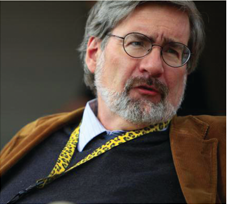"I consider myself an investigative journalist, even as a teacher. It informs everything I do," says McBride, a gentlemanly chap with a calm baritone voice. He's sitting in his Burk Hall office, dressed in gray slacks and gray V-neck sweater, a blue tie and brown suede blazer ("I think it's good for professors to look kind of formal," he says with smile). An old poster for "Rock 'n' Roll High School" hangs on the wall. So does a photograph of John Ford's 1973 funeral. John Wayne stands near the flag-draped coffin, a few feet away from a young bespectacled man named McBride.

"I consider myself an investigative journalist, even as a teacher. It informs everything I do."
— Joseph McBride
The author spent 30 years researching his book on Ford, whom he felt hadn't been given his due as a serious artist, and whose life story had never really been told. He was motivated to write the Spielberg biography for similar reasons.
"Ford presented himself as just a humble craftsman, a sort of semi-literate cowboy," McBride says, "while in fact, he was a very well-read man who knew a lot about history and politics. So it was a pose. I wanted to know where his films came from... By doing all this research, I think I was able to draw connections between the man and the films in a way that made sense."
McBride makes those connections in the Ford course he's teaching this semester (in the fall he focused on Hitchcock). On this winter day, he shows "Kentucky Pride," a rare 1925 silent film that transfers familiar Ford themes to the world of horses.
"It's actually narrated by a horse, which you could only get away with in a silent film," McBride tells his students before the screening. "If you did that today it would sound like Mister Ed. This film deals with family and tradition and duty, which are a big part of Ford's thematic palette." When the movie's over, McBride stirs up a discussion that touches on everything from Ford's portrayal of African Americans to the human qualities ascribed to horses.
"I would not be exposed to Ford's films with such richness and intensity if it weren't for McBride," cinema major Anthony Thomas says after class. "He really knows his stuff."
McBride's screenwriting students feel the same way. "He's probably got more firsthand field experience than anybody here," says Elliot Moran. "The guy drops Orson Welles' name. That's impressive."
McBride first met Welles in 1970. The irascible director cast him as an obsessive cineaste who follows John Huston around in Welles' unfinished final picture, "The Other Side of the Wind." They spent six years shooting the film, which has yet to be edited and released (it remains in legal limbo and the subject of movie-world rumors).
"I wasn't an actor at all," says McBride, who played a satire of himself, and helped Welles shape some of the dialogue. Working on that picture "was my film school" he adds.
McBride's forthcoming book, "Writing in Pictures: Screenwriting Made (Mostly) Painless," is modeled on his classes at SF State, where he feels lucky to have students who challenge his assumptions. "You learn so much from them," he says. "They keep you on your toes."
Go "Behind the Curtain" with Joseph McBride at youtube.com.

McBride has enjoyed close-ups with Hollywood greats, including (from left to right) Howard Hawks, Frank Capra, Akira Kurosawa, John Ford, Orson Welles, Steven Spielberg and Billy Wilder.
Return to page one of Hollywood Myth Buster
See Joseph McBride's lists of must-see films